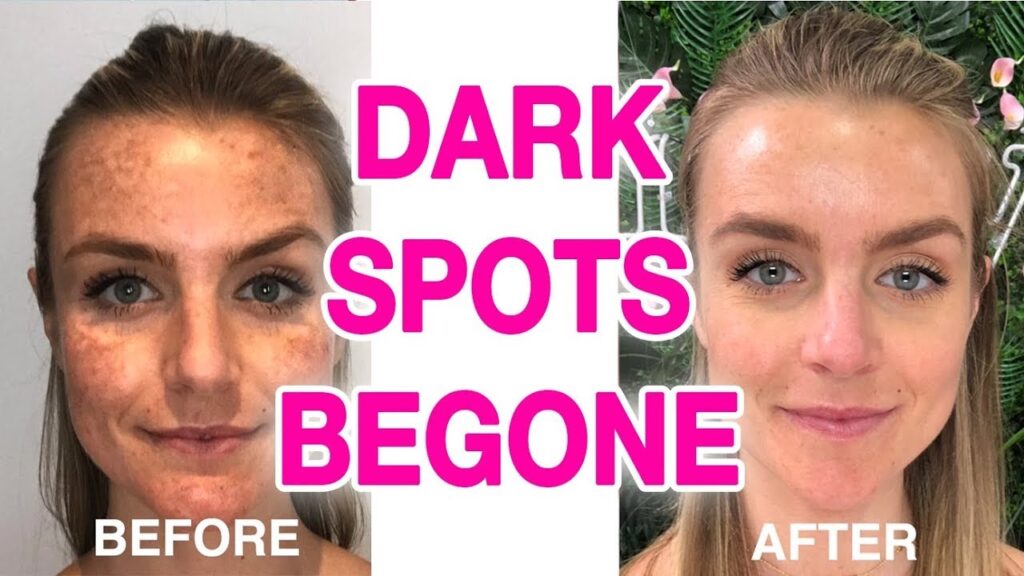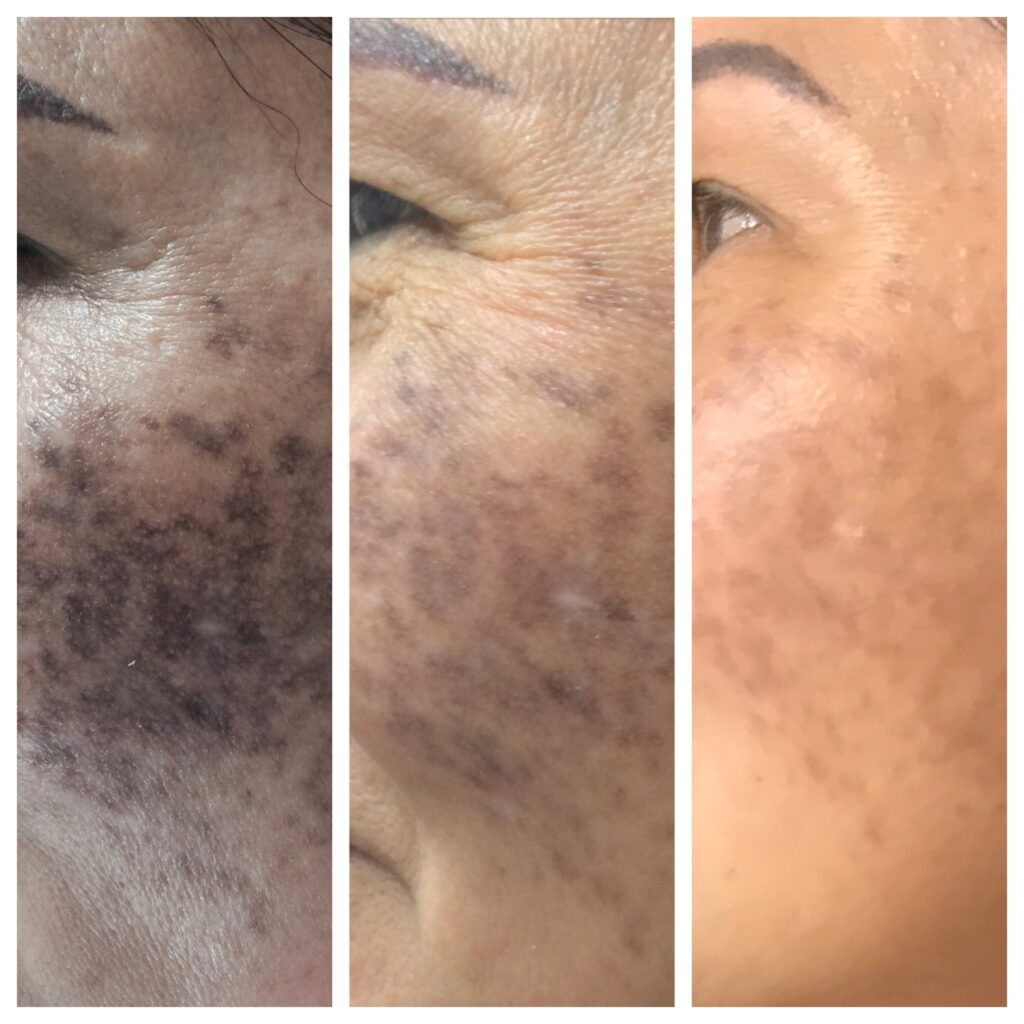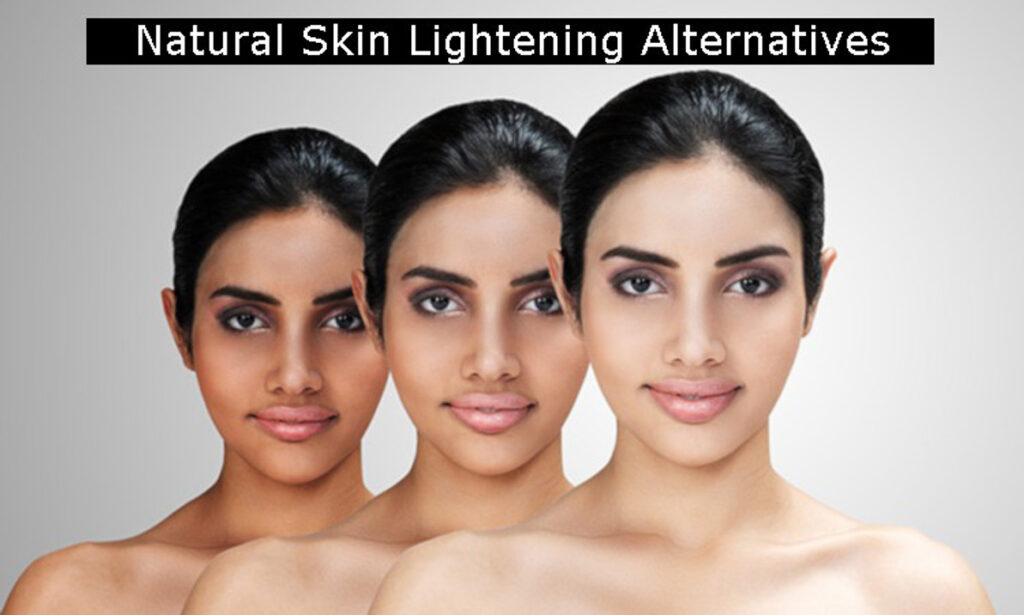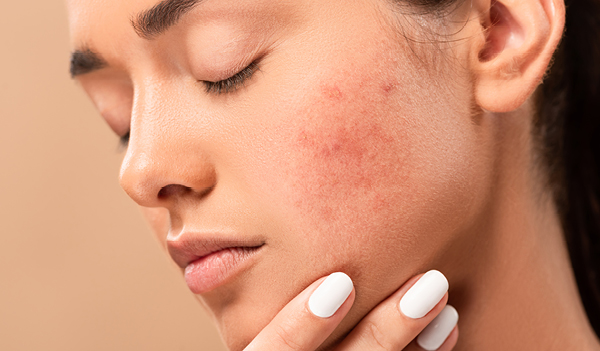Dark spots, also known as hyperpigmentation, are a common skin concern that can affect people of all ages and skin types.
These areas of the skin are darker than the surrounding skin and can appear as small, flat spots or larger patches on the face, hands, arms, and other areas of the body. In this blog post, we will delve into the causes, prevention, and treatment options for dark spots.
What are Dark Spots?
Dark spots, or hyperpigmentation, occur when there is an overproduction of melanin in certain areas of the skin. Melanin is the pigment responsible for giving our skin its color. When there is an excess production of melanin, it can lead to the formation of dark spots. These spots can vary in size and shape, ranging from small freckles to larger patches.

Causes of Dark Spots
There are several factors that can contribute to the development of dark spots. One of the primary causes is sun exposure. When the skin is exposed to the sun’s harmful UV rays, it triggers an increase in melanin production as a protective mechanism. Over time, this can lead to the formation of dark spots.
Hormonal changes can also play a role in the development of dark spots. Pregnant women often experience a condition called melasma, which causes dark patches to appear on their face. Hormonal imbalances can also contribute to the formation of dark spots in both men and women.
Skin injuries, such as acne or cuts, can result in post-inflammatory hyperpigmentation. When the skin is damaged, it responds by producing excess melanin in the affected area, leading to dark spots.
Types of Dark Spots
There are several types of dark spots that can occur on the skin. Age spots, also known as liver spots or solar lentigines, are commonly seen in older individuals and are caused by years of sun exposure. These spots typically appear on areas of the body that are frequently exposed to the sun, such as the face, hands, and arms.
Melasma is another type of dark spot that is characterized by larger patches of hyperpigmentation. It is often triggered by hormonal changes, such as pregnancy or the use of hormonal contraceptives. Melasma commonly affects women and can be challenging to treat.
Post-inflammatory hyperpigmentation occurs as a result of skin injuries or inflammation. This type of dark spot can be caused by acne, cuts, burns, or other skin conditions. The dark spots may fade over time but can persist for months or even years.
Who is at Risk for Dark Spots?
While anyone can develop dark spots, certain factors can increase an individual’s risk. People with fair skin are more susceptible to hyperpigmentation because they have less melanin to protect their skin from the sun’s harmful rays. Additionally, individuals with a history of sun exposure are more likely to develop dark spots.
Hormonal imbalances can also increase the risk of developing dark spots. Women who are pregnant or taking hormonal contraceptives are particularly prone to melasma. Certain medications, such as antibiotics and anti-seizure drugs, can also make the skin more sensitive to sunlight and increase the risk of hyperpigmentation.

Prevention of Dark Spots
Preventing dark spots requires a combination of lifestyle changes and skincare practices. One of the most crucial steps in preventing dark spots is wearing sunscreen daily. Sunscreen helps protect the skin from harmful UV rays and reduces the risk of melanin overproduction.
Avoiding tanning beds is also essential in preventing dark spots. Tanning beds emit UV radiation that can damage the skin and lead to hyperpigmentation. It is best to embrace your natural skin tone and protect it from excessive sun exposure.
Using gentle skincare products is another important aspect of preventing dark spots. Harsh cleansers and exfoliants can irritate the skin and potentially trigger inflammation, leading to post-inflammatory hyperpigmentation. Opt for mild cleansers and exfoliate gently to maintain healthy skin.
Lifestyle Changes to Prevent Dark Spots
In addition to skincare practices, certain lifestyle changes can help prevent dark spots. Eating a healthy diet rich in antioxidants can promote skin health and reduce the risk of hyperpigmentation. Antioxidants, such as vitamins A, C, and E, help protect the skin from free radicals and promote a more even complexion.
Staying hydrated is also crucial for maintaining healthy skin. Drinking an adequate amount of water helps flush out toxins from the body and keeps the skin hydrated and supple. Dehydrated skin is more prone to damage and can exacerbate the appearance of dark spots.
Getting enough sleep is often overlooked but plays a significant role in skin health. During sleep, the body repairs and rejuvenates itself, including the skin. Lack of sleep can lead to increased stress levels, which can trigger hormonal imbalances and potentially worsen dark spots.
Skincare Tips to Prevent Dark Spots
In addition to lifestyle changes, incorporating specific skincare tips into your routine can help prevent dark spots. Using a gentle cleanser that does not strip the skin of its natural oils is essential. Harsh cleansers can disrupt the skin’s barrier function and make it more susceptible to damage and hyperpigmentation.
Regular exfoliation is also beneficial in preventing dark spots. Exfoliating removes dead skin cells from the surface of the skin, allowing for better absorption of skincare products and promoting cell turnover. However, it is important to exfoliate gently to avoid irritating the skin.
Using skincare products that contain ingredients like vitamin C and retinol can also help prevent dark spots. Vitamin C is a potent antioxidant that can help brighten the skin and reduce the appearance of hyperpigmentation. Retinol, a derivative of vitamin A, promotes cell turnover and can help fade dark spots over time.
Natural Remedies to Prevent Dark Spots
For those who prefer natural remedies, there are several options that can help prevent dark spots. Lemon juice is a popular natural remedy due to its high vitamin C content. Applying lemon juice to the skin can help lighten dark spots and promote a more even complexion. However, it is important to dilute lemon juice with water as it can be too acidic and potentially irritate the skin.
Aloe vera is another natural remedy that has been used for centuries to treat various skin conditions. It has soothing properties and can help reduce inflammation, which may contribute to the formation of dark spots. Applying aloe vera gel to the skin regularly can help prevent hyperpigmentation.
Green tea is known for its antioxidant properties and can be beneficial in preventing dark spots. Drinking green tea regularly or applying it topically can help protect the skin from free radicals and reduce the risk of hyperpigmentation.
Medical Treatments for Dark Spots
If you already have dark spots, there are several medical treatments available that can help fade them. Topical treatments, laser treatments, and chemical peels are commonly used to address hyperpigmentation.
Topical Treatments for Dark Spots
Topical treatments for dark spots often contain ingredients that inhibit the production of melanin in the skin. Hydroquinone is a commonly used ingredient that works by blocking an enzyme involved in melanin production. Kojic acid is another ingredient that can help lighten dark spots (similar to skin lighteners) by inhibiting tyrosinase, an enzyme necessary for melanin synthesis. Retinoids, derived from vitamin A, promote cell turnover and can help fade dark spots over time.
A good product to try out is Meladerm Pigment Correcting Cream from Civant Skincare.
Laser Treatments for Dark Spots
Laser treatments for dark spots use targeted beams of light to break up the pigment in the skin. This process, known as selective photothermolysis, helps fade dark spots and improve overall skin tone. Laser treatments can be effective for various types of hyperpigmentation, including age spots, melasma, and post-inflammatory hyperpigmentation.
Chemical Peels for Dark Spots
Chemical peels involve applying a solution to the skin that causes the top layer to peel off. This process stimulates cell turnover and helps fade dark spots over time. Chemical peels can be customized based on the individual’s skin type and the severity of their hyperpigmentation.
Hyperpigmentation is a common skin condition characterized by the darkening of certain areas of the skin. It occurs when there is an overproduction of melanin, the pigment responsible for giving color to our skin, hair, and eyes. There are several factors that can contribute to the development of hyperpigmentation, including sun exposure, hormonal changes, inflammation, and skin injuries. Dark spots caused by hyperpigmentation can be a source of self-consciousness for many individuals, leading to a desire to find effective treatments.
Treating dark spots is not only a matter of aesthetics but also of overall skin health. Hyperpigmentation can be a sign of underlying skin damage and can also increase the risk of developing more serious conditions such as skin cancer. Therefore, it is important to address dark spots and take steps to lighten them in order to maintain healthy and radiant skin.
Natural Remedies for Lightening Dark Spots

1. Lemon juice: Lemon juice contains natural bleaching properties that can help lighten dark spots. The citric acid in lemon juice acts as a natural exfoliant, removing dead skin cells and promoting the growth of new, healthy skin cells. To use lemon juice for dark spot treatment, simply squeeze fresh lemon juice onto a cotton ball and apply it to the affected areas. Leave it on for about 10 minutes before rinsing off with water.
2. Aloe vera: Aloe vera has been used for centuries for its healing properties, including its ability to lighten dark spots. It contains aloin, a compound that inhibits the production of melanin. Apply fresh aloe vera gel directly onto the dark spots and leave it on for 30 minutes before rinsing off with water. Regular use can help fade dark spots over time.
3. Turmeric: Turmeric is a spice commonly used in cooking, but it also has powerful skin-lightening properties. It contains curcumin, a compound that inhibits the production of melanin. Create a paste by mixing turmeric powder with milk or water and apply it to the dark spots. Leave it on for 15-20 minutes before rinsing off. Be cautious as turmeric can stain clothing and skin temporarily.
4. Green tea: Green tea is not only a refreshing beverage but also a natural remedy for lightening dark spots. It contains antioxidants that help reduce inflammation and promote skin healing. Brew a cup of green tea and allow it to cool. Dip a cotton ball into the tea and apply it to the dark spots. Leave it on for 15 minutes before rinsing off.
5. Apple cider vinegar: Apple cider vinegar has been used for centuries as a natural remedy for various skin conditions, including hyperpigmentation. It contains acetic acid, which helps exfoliate the skin and lighten dark spots. Mix equal parts of apple cider vinegar and water, then apply the mixture to the dark spots using a cotton ball. Leave it on for 5-10 minutes before rinsing off.
The Benefits of Using Vitamin C for Dark Spots
Vitamin C is a powerful antioxidant that offers numerous benefits for the skin, including its ability to lighten dark spots. It works by inhibiting the production of melanin and promoting collagen production, which can help improve overall skin tone and texture.
When choosing vitamin C products for dark spot treatment, look for serums or creams that contain a high concentration of vitamin C, preferably in the form of L-ascorbic acid. This form of vitamin C is most effective in penetrating the skin and delivering its benefits.
To use vitamin C for dark spot treatment, apply a few drops of the serum or cream onto clean, dry skin. Gently massage it into the affected areas until fully absorbed. It is best to use vitamin C products in the morning, followed by a broad-spectrum sunscreen to protect the skin from further damage.
It is important to note that vitamin C can cause skin sensitivity in some individuals. If you experience any irritation or redness, discontinue use and consult a dermatologist for further guidance.
How to Use Hydroquinone for Dark Spot Treatment
Hydroquinone is a topical medication commonly used for the treatment of hyperpigmentation. It works by inhibiting the production of melanin, thereby lightening dark spots. Hydroquinone is available over-the-counter in concentrations up to 2%, but higher concentrations require a prescription.
To use hydroquinone for best results, start by cleansing the skin thoroughly and patting it dry. Apply a thin layer of hydroquinone cream or gel onto the dark spots, avoiding the surrounding healthy skin. Massage it gently until fully absorbed. It is recommended to use hydroquinone twice daily, but follow the instructions provided by your dermatologist or the product packaging.
While hydroquinone is generally safe to use, it is important to take precautions and follow the recommended usage guidelines. Prolonged use of high concentrations of hydroquinone can lead to skin irritation, redness, and even permanent skin discoloration. It is advisable to consult a dermatologist before starting any hydroquinone treatment.
The Role of Retinoids in Lightening Dark Spots
Retinoids are derivatives of vitamin A that have been widely used in skincare for their ability to promote cell turnover and improve skin texture. They are also effective in treating hyperpigmentation by increasing the shedding of pigmented skin cells and promoting the growth of new, lighter cells.
When using retinoids for dark spot treatment, it is important to start with a low concentration and gradually increase as tolerated. This helps minimize potential side effects such as dryness, redness, and peeling. It is best to apply retinoids at night, as they can increase the skin’s sensitivity to sunlight.
Look for retinoid products that contain ingredients such as retinol, retinaldehyde, or tretinoin. These are the most commonly used forms of retinoids in skincare products. Begin by applying a pea-sized amount of the product onto clean, dry skin and gently massage it in. Follow with a moisturizer to help minimize dryness.
Choosing the Right Sunscreen for Hyperpigmented Skin
Sunscreen is an essential part of any skincare routine, especially for individuals with hyperpigmented skin. Sun exposure can worsen existing dark spots and also lead to the development of new ones. Therefore, it is crucial to choose a sunscreen that provides broad-spectrum protection against both UVA and UVB rays.
When selecting a sunscreen for hyperpigmented skin, look for ingredients such as zinc oxide or titanium dioxide, as these provide physical protection by reflecting the sun’s rays. Additionally, opt for a sunscreen with an SPF of 30 or higher to ensure adequate protection.
It is important to apply sunscreen generously and reapply every two hours, or more frequently if sweating or swimming. Pay extra attention to areas prone to hyperpigmentation, such as the face, neck, and hands. Incorporating sunscreen into your daily routine can help prevent further darkening of existing spots and protect against the development of new ones.
Hyperpigmentation and Allergies: Identifying Triggers
In some cases, allergies can trigger or worsen hyperpigmentation. When the skin is exposed to an allergen, it can become inflamed and produce excess melanin, leading to dark spots. Common allergens that can cause hyperpigmentation include certain skincare products, fragrances, dyes, and even certain foods.
To identify potential allergens that may be contributing to your hyperpigmentation, it is important to pay attention to any changes or reactions that occur after using certain products or consuming specific foods. Keep a journal to track any patterns or correlations between exposure to potential allergens and the appearance of dark spots.

If you suspect that allergies may be contributing to your hyperpigmentation, it is advisable to consult a dermatologist or allergist for further evaluation. They can perform tests to identify specific allergens and provide guidance on how to avoid them.
Tips for Preventing Future Dark Spots
Prevention is key when it comes to managing hyperpigmentation and preventing the development of future dark spots. Here are some tips to help protect your skin and maintain an even complexion:
1. Wear sunscreen daily: As mentioned earlier, sunscreen is crucial in preventing sun-induced hyperpigmentation. Make it a habit to apply sunscreen with at least SPF 30 every day, even on cloudy days or during the winter months.
2. Seek shade: When the sun is at its strongest, typically between 10 am and 4 pm, seek shade whenever possible. This reduces your exposure to harmful UV rays and helps prevent the development of dark spots.
3. Wear protective clothing: In addition to sunscreen, wearing protective clothing such as wide-brimmed hats, long-sleeved shirts, and sunglasses can provide an extra layer of defense against the sun’s rays.
4. Avoid picking at your skin: Picking at acne or other skin blemishes can lead to post-inflammatory hyperpigmentation. Resist the urge to pick or squeeze pimples, as this can cause further damage and increase the risk of dark spots.
5. Maintain a healthy lifestyle: A healthy lifestyle can contribute to overall skin health. Eat a balanced diet rich in fruits, vegetables, and antioxidants, exercise regularly to improve blood circulation, and get enough sleep to allow your skin time to repair and regenerate.
Personalized Skincare Routines for Hyperpigmented Skin
Every individual’s skin is unique, and what works for one person may not work for another. Therefore, it is important to create a personalized skincare routine tailored to your specific needs and concerns.
1. Cleanse: Start by cleansing your skin twice daily with a gentle cleanser that does not strip away natural oils. Look for cleansers that contain ingredients such as salicylic acid or glycolic acid, which can help exfoliate the skin and promote cell turnover.
2. Treat: After cleansing, apply any treatment products such as vitamin C serums, hydroquinone creams, or retinoids. Follow the instructions provided by the product manufacturer or consult a dermatologist for personalized recommendations.
3. Moisturize: Hydrating the skin is essential for maintaining its barrier function and preventing moisture loss. Choose a moisturizer that suits your skin type and apply it after treatment products to lock in moisture.
4. Protect: Finish your skincare routine by applying a broad-spectrum sunscreen with at least SPF 30. This step is crucial in preventing further darkening of existing spots and protecting against the development of new ones.
It is important to note that consistency is key when it comes to skincare routines. Give your skin time to adjust to new products and be patient with the results. If you experience any adverse reactions or if your hyperpigmentation worsens, consult a dermatologist for further guidance.
Tips for Managing Hyperpigmentation in Humid Environments
Humidity can pose additional challenges when it comes to managing hyperpigmentation. The increased moisture in the air can lead to excess oil production and clogged pores, which can exacerbate existing dark spots.

Here are some tips to help manage hyperpigmentation in humid environments:
1. Cleanse regularly: In humid environments, it is important to cleanse your skin more frequently to remove excess oil and sweat. Use a gentle cleanser that does not strip away natural oils, and consider using a toner to help control oil production.
2. Use lightweight products: Opt for lightweight, oil-free moisturizers and serums that won’t feel heavy or greasy on the skin. Look for products labeled as non-comedogenic, which means they are less likely to clog pores.
3. Exfoliate regularly: Exfoliation helps remove dead skin cells and unclog pores, which can help prevent the formation of dark spots. However, be cautious not to over-exfoliate, as this can irritate the skin. Limit exfoliation to 1-2 times per week and choose gentle exfoliants.
4. Keep skin cool: Use a facial mist or a cooling gel to keep your skin refreshed and cool throughout the day. This can help reduce inflammation and prevent excessive sweating, which can contribute to the development of dark spots.
5. Stay hydrated: Drinking plenty of water is important for maintaining overall skin health, especially in humid environments where dehydration can occur more easily. Hydrated skin is less prone to inflammation and can better regulate oil production.
Hyperpigmentation is a common skin condition that can be a source of self-consciousness for many individuals. Fortunately, there are various treatments and preventive measures that can help lighten dark spots and maintain healthy skin.
Natural remedies such as lemon juice, aloe vera, turmeric, green tea, and apple cider vinegar can be effective in lightening dark spots. Vitamin C, hydroquinone, and retinoids are also commonly used treatments for hyperpigmentation. It is important to choose the right sunscreen for hyperpigmented skin and identify potential allergens that may trigger or worsen dark spots.
Prevention is key in managing hyperpigmentation, and adopting a personalized skincare routine tailored to your specific needs is crucial. Additionally, managing hyperpigmentation in humid environments requires special attention to cleansing, using lightweight products, and keeping the skin cool.
If dark spots persist or worsen despite these measures, it is advisable to seek professional help from a dermatologist. They can provide further guidance and recommend advanced treatments such as chemical peels, laser therapy, or microdermabrasion.
Remember, achieving and maintaining healthy, radiant skin takes time and patience. With the right approach and consistency, it is possible to lighten dark spots and achieve a more even complexion.
Conclusion: Taking Care of Your Skin
Dark spots can be a frustrating skin concern, but there are many ways to prevent and treat them. By incorporating lifestyle changes such as wearing sunscreen, eating a healthy diet, staying hydrated, and getting enough sleep, individuals can reduce their risk of developing dark spots. Additionally, following skincare tips like using gentle cleansers, exfoliating regularly, and incorporating products with vitamin C and retinol can help maintain a more even complexion.
For those who prefer natural remedies, options like lemon juice, aloe vera, and green tea can provide some benefits in preventing dark spots. However, it is important to remember that natural remedies may not be as effective as medical treatments.
If dark spots have already formed, seeking professional treatment such as topical treatments, laser treatments, or chemical peels can help fade them and improve overall skin tone. It is essential to consult with a dermatologist or skincare professional to determine the most suitable treatment option based on individual needs.
By taking care of your skin and seeking professional treatment when necessary, you can achieve a brighter, more even complexion and regain confidence in your appearance. Remember that prevention is key when it comes to dark spots, so make sure to prioritize sun protection and maintain a healthy skincare routine.